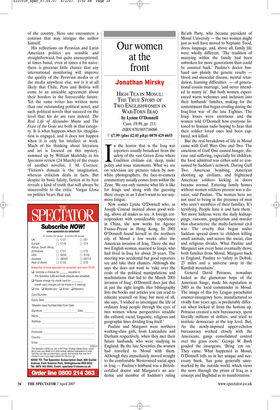Our women at the front
Jonathan Mirsky
HIGH TEA IN MOSUL: THE TRUE STORY OF TWO ENGLISHWOMEN IN WAR-TORN IRAQ by Lynne O’Donnell Cyan, £9.99, pp. 213, ISBN 9781905736096 V £7.99 (plus £2.45 p&p) 0870 429 6655 In the horror that is the Iraq war reporters usually broadcast from the safety of the vast Green Zone where Coalition civilians eat, sleep, make policy and issue statements. What we see on television are pictures taken by nonwhite photographers; the face-to-camera commentary usually comes from within the Zone. We can only surmise what life is like for Iraqis and along with the guessing there creeps in an I-don’t-want-to see-anymore fatigue.
Now comes Lynne O’Donnell who, as Joseph Conrad insisted about good writing, above all makes us see. A foreign correspondent with considerable experience in China, she now works for Agence France-Presse in Hong Kong. In 2003 O’Donnell found herself in the northern city of Mosul a few weeks after the American invasion of Iraq. There she met two English women, married to Iraqis, who had lived in Iraq for about 28 years. The meeting was accidental but good reporters see and take their chances. Although she says she does not want to ‘rake over the coals of the political manipulations and machinations that led to the March 2003 invasion of Iraq’, O’Donnell does just that at just the right length. Her bibliography lists the books and articles you can read to educate yourself on Iraq; but most of all, she says, ‘I wished to investigate the life of ordinary Iraqi people through the eyes of two women whose perspectives straddle the cultural, racial, linguistic, religious and geographic lines dividing Iraq itself.’ Pauline and Margaret were northern working-class girls, from Lancashire and Durham respectively, when they met their future husbands, who were studying in England. By the late Seventies the women had travelled to Mosul with them. Although they immediately moved straight to the comfortable Westernised social apex in Iraq — Pauline’s husband was a Britishcertified doctor and Margaret’s an academic and member of Saddam’s ruling Ba’ath Party, who became president of Mosul University — the two women might just as well have moved to Neptune. Food, dress, language, and, above all, family life were wholly different. ‘The tradition of marrying within the family had been unbroken for more generations than could be counted back.’ Pauline’s doctor husband saw plainly the genetic results blood and muscular disease, mental retardation, learning difficulties — of generational cousin marriage, ‘and never intended to marry in’. But both women experienced warm welcomes and inclusion into their husbands’ families, making for the contentment that began eroding during the Iraq-Iran war of the late Eighties. The Iraqi losses were enormous and the women told O’Donnell how everyone listened to Iranian radio hoping to hear that their soldier loved ones had been captured, not killed.
But the real breakdown of life in Mosul came with Gulf Wars One and Two. The sanctions of Gulf One caused hunger, disease and suffering, especially for children; the food admitted was either sold or consumed by Saddam’s network. During Gulf Two, American bombing, American shooting up civilians, and frightened American soldiers kicking in doors became normal. Entering family homes without women soldiers present was a disaster, said Pauline. ‘The women here are not used to being in the presence of men who aren’t members of their families. It’s terrifying. People hate it and hate them.’ Yet more hideous were the daily kidnappings, ransoms, gangsterism and murder that characterise the multi-factional civil war. The cruelty that began under Saddam spread down to children killing small animals, and across the social, clan and religious divides. What Pauline and Margaret saw every hour eventually drove both families from Mosul, Margaret back to England, Pauline to ‘safety in Dohuk, 25 miles and a universe away in the Kurdish mountains’.
General David Petraeus, nowadays hailed as the glamorous hope of the American Surge, made his reputation in 2003 as the local commander in Mosul. The image of this Ivy League parachutist counter-insurgency hero, manufactured so vividly four years ago, is predictably different when looked at from the bottom up. Petraeus created a new bureaucracy, spent literally millions of dollars, and tried to institute democracy at the top level. But, ‘As the newly-imposed upper-echelon bureaucracy worked closely with the Americans, gangs consolidated control over the grass roots.’ George W. Bush goaded the insurgents, ‘Bring ’em on.’ They came. What happened in Mosul, O’Donnell tells us in her unique and necessary book, ‘has gone generally unremarked by the outside world, which views the news through the prism of Iraq as a concept and Baghdad as its manifestation.’


































































 Previous page
Previous page